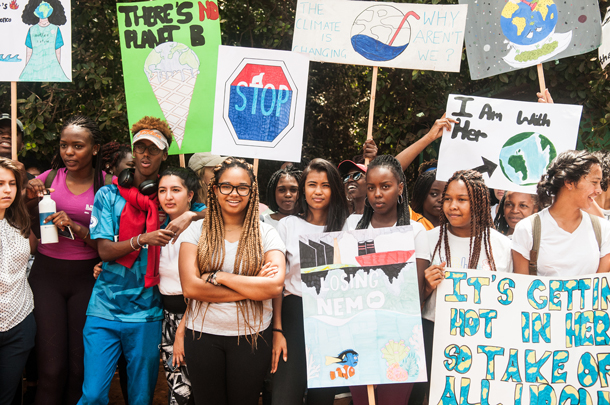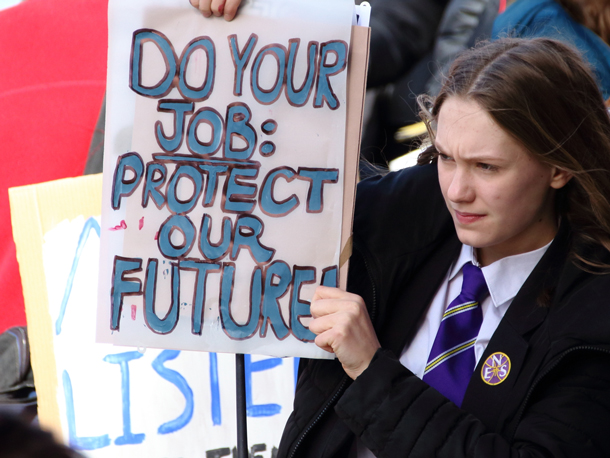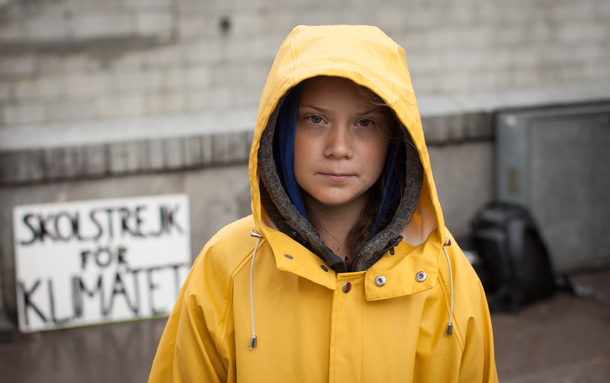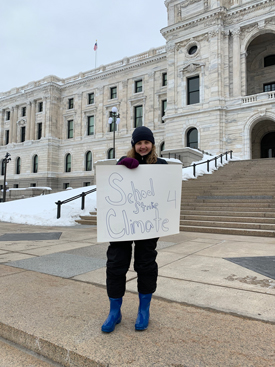Youth Strike for Climate
Air Date: Week of March 15, 2019

Young people on strike for the climate gather in the Karura Forest in Nairobi. (Photo: Flickr, UNEP, CC BY-NC-SA 2.0)
On March 15 an estimated million school children around the world went on strike for the climate, inspired by Greta Thunberg, who began striking outside the Swedish parliament during school hours in August of 2018 when she was fifteen years old. Anna Grace Hottinger helped organize the March 15 school strike in the US, and joined Host Steve Curwood to discuss the movement.
Transcript
[THEME]
CURWOOD: From PRI and the Jennifer and Ted Stanley Studios at the University of Massachusetts Boston, this is Living on Earth. I’m Steve Curwood.
On Friday March 15th as many as a million school children in as many as 100 different countries lined up for the school strike for the climate. They demonstrated from Honolulu to Holland to Hong Kong.
[CROWD CHANTING] What do want? Climate action! When do we want it? Now!
LILY: As you can tell, we’re in the Hague! It’s a global school strike today, so that we can make politicians wake up and do some action!
CURWOOD: At age 10 Lily marched in The Hague, as others spoke out in New Delhi and London.
BOY: Today, as you can see, a lot of people have come here and this movement has really gained momentum, even in Delhi. What I initially felt was that in India people are completely in denial of the fact that climate change is a thing. But as you can see, they’ve really, you know, made people get their voices heard. And we really spread this idea across, that change is possible.
[CROWD CHANTING]
ALICE: Alice, I’m 17. I came here because it’s scary, what’s happening to the world. It’s really scary, and no one is fixing it so we might as well try.

A student climate striker in Nottingham, England (Photo: kthrnr, Flickr, CC BY-NC-ND 2.0)
REPORTER: How much do you think they’re doing right now?
ALICE: Nothing, they’re doing nothing. And they’re busy, I get that, Brexit’s happening. But they should be doing more because this isn’t going away anytime soon.
GREG: I’m Greg, I’m 16. I came here because there is a lack of action on climate change and it’s the most important issue at this day. The government needs to declare a climate emergency as soon as possible because we are seeing no action being taken and it’s ridiculous. We just need to show the government that this is an issue we really care about, because they’re ignoring us, essentially, and this is showing we care about this and it’s a huge issue. I worry that even if we stick in school and we get our educations that we won’t be able to get jobs, because the whole industries will be affected, everything’s going to be affected in the future. We’re going to see irreversible results of climate change if we don’t take action now, so it needs to be done. I’ll keep coming until more radical action is taken. My school isn’t totally supportive of it but at the end of the day, this is a bigger issue than my education.
LOOK AT THE SIZE OF THE MARCH IN BRUSSELS!!! Young people are rising in 2052 places in 123 countries on every continents.
— Mike Hudema (@MikeHudema) March 15, 2019
There is no time to waste. We must #ActOnClimate. #climatestrike #klimaatstaking #FridayForFutures #GreenNewDeal @GretaThunberg ???? via @JohnHyphen pic.twitter.com/3CGLMDYE8v
CURWOOD: Their common demand is simple. Take action now while there is still time to avert the worst possible effects from climate disruption. This is a growing movement. Students from roughly 1000 different schools in the US alone joined the school strike. And in South Africa, young climate champions gathered next to Parliament in Cape Town.
[CHANTING AND DRUMMING SOUNDS]
CURWOOD: The spark for the strike comes from Swedish student Greta Thunberg, who in August of 2018 at the age of 15 began skipping school and sat down in front of the Swedish Parliament. She was angry that Sweden would not meet its targets under the Paris Climate Agreement. Until the Swedish election on September 9th, she sat with a simple handmade sign proclaiming she was on a “school strike for the climate”. Every Friday following the elections, she has kept the strike going and inspired students around the globe to join her. By the way, Greta Thunberg is a distant relative of Nobel prize winning chemist Svante Arrhenius, the man who a century ago famously made calculations that showed increasing carbon dioxide emissions would lead to a warming world. And some people think Greta herself should get the Nobel Peace Prize. By December of 2018 she was invited to speak at the UN Climate Treaty negotiations in Poland.
Youth in 2 052 places in 123 countries across the globe are taking a stand demanding #ClimateAction!???? ???? ????.
— Greenpeace Africa (@Greenpeaceafric) March 15, 2019
Students outside parliament in #CapeTown making their voices heard.#FridaysForFuture #SchoolsStrike4Climate #ClimateStrike #Fridays4Future
Video source: .@AshrafRSA pic.twitter.com/aM5TitsPWz
THUNBERG: You only talk about moving forward with the same bad ideas that got us into this mess, even when the only sensible thing to do is pull the emergency brake. You are not mature enough to tell it like it is -- even that burden you leave to us children. But I don’t care about being popular, I care about climate justice and a living planet. Our civilization is being sacrificed for the opportunity of a very small number of people to continue making enormous amounts of money. Our biosphere is being sacrificed so that rich people in countries like mine can live in luxury. You say you love your children above all else, and yet you are stealing their future in front of their very eyes. Until you start focusing on what needs to be done, rather than what is politically possible there is no hope. We have not come here to beg world leaders to care. You have ignored us in the past and you will ignore us again. You have run out of excuses and we are running out of time. We have come here to let you know that change is coming, whether you like it or not. The real power belongs to the people. Thank you.
[APPLAUSE]
CURWOOD: Greta was more enthusiastically welcomed by the European Economic and Social Committee in Brussels in February of 2019.
[APPLAUSE]
THUNBERG: And if you think that we should be in school instead, then we suggest you take our place in the streets, striking from your work. Or better yet join us so we can speed up the process. And if you still say that we are wasting valuable lesson time, then let me remind you that our political leaders have wasted decades through denial and inaction. And since our time is running out we have decided to take action. We have decided to clean up your mess and we will not stop until we are done. Thank you.

Greta Thunberg sparked the School Strike for Climate movement, which began in August of 2018 when she began protesting Sweden’s lack of compliance in the Paris Agreement. (Photo: Anders Hellberg, Wikimedia Commons, CC BY-SA 4.0)
[APPLAUSE]
[CROWD SINGING]: We want change, we want change. We want to save the human race…
CURWOOD: The majority of the million or so students around the world who went on strike for the climate March 15th appear to be young women, and a US organizer was 16-year old Anna Grace Hottinger of Shoreview, Minnesota. She joins us now. Anna Grace, welcome to Living on Earth!
HOTTINGER: Hi, thank you for having me.
CURWOOD: In your own words, please tell me about the Fridays for Future movement.
HOTTINGER: Yeah. So Fridays for Future was started by Greta Thunberg because Sweden was not on the Paris Agreement, and she wanted them to get back on board with them. And so Fridays for Future was started by her, because she strikes from school every Friday and went to the parliament. And it has now been brought forth to places all around the world. So people can join along and strike every single Friday, because striking is more important than education, if you might not have a reason to have that education in the future.
CURWOOD: Indeed. How concerned are you personally about this? What's the threat that you feel personally from climate disruption?
HOTTINGER: I personally just feel like I may not be able to see it in my own eyes in the future, because I am privileged enough to be able to move out of these situations. But also, that it soon won't be something that that we can shift out of, which is a very scary thing. Because no matter what, we'll all be stuck with this issue. But I see that we have the potential in it.
CURWOOD: So you say you're privileged to be able to move out of this. What do you mean?
HOTTINGER: The wildfires, for example. In California, people were able to hire private firefighters, and people to rebuild their giant houses, whereas other people couldn't move back to their houses. And you see that in hurricanes, and earthquakes, and all these sorts of things where people are able to move out of those situations and find a healthier and sustainable way to live. Whereas other people are not privileged enough to be able to go out of those places.
CURWOOD: Anna Grace, tell me the moment that you said, I have to do this.
HOTTINGER: Wow. So, I’m a big economy person, I love economics. And I looked into it, because I realized that the economy would be kind of screwed up. And then a few weeks later, my sister was actually in the California wildfires. And I hadn't done anything yet. But I decided that that's when I needed to do something, because this is an effect of climate change.
CURWOOD: Your sister was in the California wildfires. How is she?
HOTTINGER: She is doing great. She was evacuated from campus, but she's doing okay now. And it was definitely a rough semester for everybody around her.
I can't believe how big the #ClimateStrike is here in London. It's huge. It's been carrying on up the mall for ever. This is just incredible. They're so loud and so awesome. pic.twitter.com/XKVVCS2Yj0
— Dr Nick Crumpton (@LSmonster) March 15, 2019
CURWOOD: So, how did you get involved in the US climate strikes - the ones inspired by Greta in Sweden?
HOTTINGER: Yeah, so I got involved because I am in Minnesota Can't Wait, which is a Minnesota climate group. And somebody had reached out saying that there's this big thing coming up inspired by Greta that was going to be global, and everybody was going to be involved in it. And they were looking for some people to help out. So I just kind of jumped on the bandwagon. And it was an easy way in, and now we're doing great things.
CURWOOD: So, what's the message that you are hoping that these school strikes will send?
HOTTINGER: So, I'm hoping that, and we are hoping that, this message will be that climate change is urgent. And that by causing social disruption, such as leaving school in big numbers, will make it so it's a forceful thing that we need to look into. So for example, the March for Our Lives, when students left school, that caused a lot of stuff, and a lot of media attention came out. And so knowing that this is an urgent matter, and putting it on the table and making it clear to adults, that this is something that the youth care greatly about.
CURWOOD: So, what's the risk to you personally, about not going to school? You're supposed to be at school on Friday.
HOTTINGER: Yeah, so the risk of not going to school. I personally don't have any punishments, though, I do miss school a lot for this type of stuff. And it does tend to backfire on all of my academic things, such as my grades and my school attendance, which I wouldn't say is the most superb out of all the school attendance there.
CURWOOD: And it's worth it because?

US Youth Climate Strike organizer Anna Grace Hottinger is a sixteen-year-old activist. (Photo: Courtesy of Anna Grace Hottinger)
HOTTINGER: It's worth it because this is a future that I'm fighting for, and helping lead for not just myself, but for so many other people. It's not just about me, but also there's really no point of studying for a future and a job that might not even be there because of what could happen.
CURWOOD: The Fridays for Future website lists some hundred countries participating in the March 15 school strike, the Friday strike, with over 1000 events in different cities. How does it feel to be part of a truly global movement?
HOTTINGER: It feels fantastic. And it feels really cool, though I'm not doing this to get attention, because the reason we're doing this is to bring climate change to the front and center. But it feels really good, because without youth such as me, and such as Greta, and such as all the other leaders, we wouldn't have been here. And these policies that are coming forward wouldn't be here either.
CURWOOD: Anna Grace, I'm sure you understand that March 15 isn't going to bring instant victory for this movement. How long do you think it will take? And then what will it look like when you've arrived at the place you're looking for?
HOTTINGER: So I think one time, like March 15, will not create the change. And what will make that happen is by going every Friday to a local place and striking, and by making your actions heard and seen, and that is how the change will come. But I think that when it happens, we're going to have lawmakers and leaders who are on board with us. And we are going to be having all kinds of goals, such as being carbon neutral, being on the Paris Climate Agreement, and so many more things. And that is what accomplishment will look like. But it'll only look like that if we keep persisting, keep showing up and keep making our voices heard.
CURWOOD: What do your friends and family think about you being, well, really a leader and a spokesperson now for this movement?
HOTTINGER: So, my friends and family are very proud of my accomplishments. They usually are like, Oh, that's really cool Anna Grace, like, we're glad you're doing this. But sometimes it does get very frustrating because I spend my evenings going to meetings. So I'll go to meetings from 4:00 until 9:00, and I won't be able to go out to dinner, or go out to the movies with my friends, or go on trips with my friends, which it does break some social relationships, but they do recognize that this is a big deal.
CURWOOD: To what extent are people saying, Anna Grace, you're obsessed with this thing, lighten up!
HOTTINGER: Right now. It’s like, the biggest thing that my mom always tells me is that I need to lighten up and be more positive about it. And to live a life as a teenager.
CURWOOD: And you say?
HOTTINGER: And I always say that I do need to live a life as a teenager. But this is what being-a-teenager reality is for me, because I'm caring for everybody around me to have those teenage years, but also to create better change in the world because my adults don't seem to be leading that.
This #climatestrike march in #Dublin is huge! pic.twitter.com/9SlO1KsnOt
— Brian McDonagh (@brianmcdonagh) March 15, 2019
CURWOOD: Anna Grace Hottinger is a sophomore at EdVisions Off-Campus charter school in Shoreview, Minnesota. Anna Grace, thanks so much for taking the time with us today.
HOTTINGER: Yeah, thank you so much for having me, and making my voice heard, and our movement’s voice heard.
Links
The Nation | “On March 15, the Climate Kids Are Coming”
CNN | “Global Climate Strike: Students Around the World Protest Climate Inaction”
Living on Earth wants to hear from you!
Living on Earth
62 Calef Highway, Suite 212
Lee, NH 03861
Telephone: 617-287-4121
E-mail: comments@loe.org
Newsletter [Click here]
Donate to Living on Earth!
Living on Earth is an independent media program and relies entirely on contributions from listeners and institutions supporting public service. Please donate now to preserve an independent environmental voice.
NewsletterLiving on Earth offers a weekly delivery of the show's rundown to your mailbox. Sign up for our newsletter today!
 Sailors For The Sea: Be the change you want to sea.
Sailors For The Sea: Be the change you want to sea.
 The Grantham Foundation for the Protection of the Environment: Committed to protecting and improving the health of the global environment.
The Grantham Foundation for the Protection of the Environment: Committed to protecting and improving the health of the global environment.
 Contribute to Living on Earth and receive, as our gift to you, an archival print of one of Mark Seth Lender's extraordinary wildlife photographs. Follow the link to see Mark's current collection of photographs.
Contribute to Living on Earth and receive, as our gift to you, an archival print of one of Mark Seth Lender's extraordinary wildlife photographs. Follow the link to see Mark's current collection of photographs.
 Buy a signed copy of Mark Seth Lender's book Smeagull the Seagull & support Living on Earth
Buy a signed copy of Mark Seth Lender's book Smeagull the Seagull & support Living on Earth

